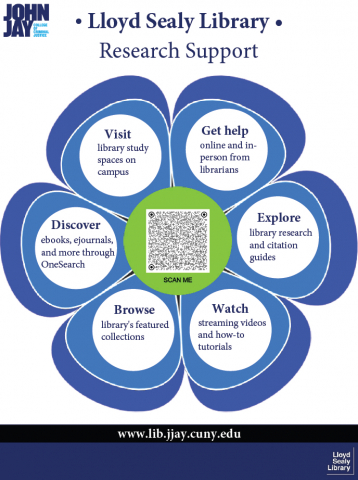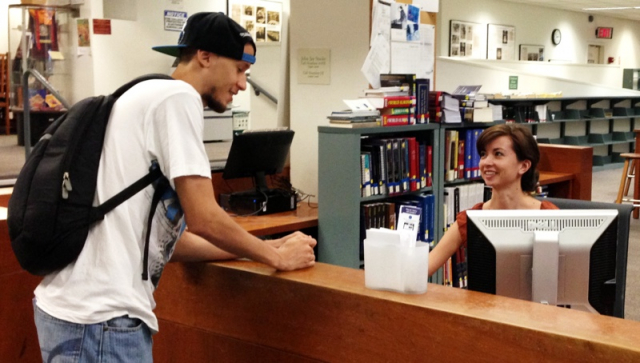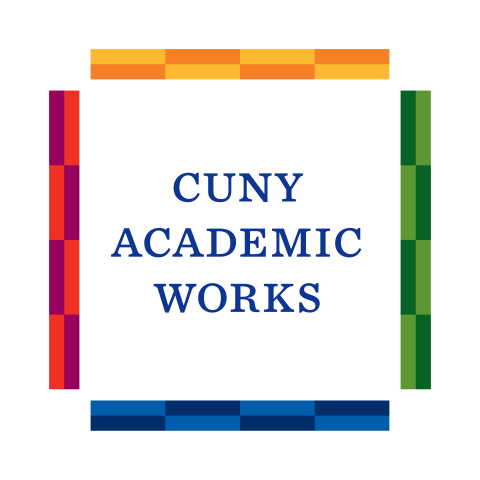Have you seen our colorful new library poster around campus? If you spot the floral design, take special notice of the flower pistil, where you’ll find a library QR code. Simply scan the code and be directed to the library’s website. Once scanned, you can get help, explore library guides, and browse the collection.
-- Kate Cauley
Library News Blog

Big changes are coming the library’s way in 2023, as we prepare to launch our new website! Our current website is built with the content management system (CMS) Drupal 7, which is nearing its end of life. Due to this future obsolescence, the library is migrating its web content to Drupal 9 and then to Drupal 10 soon after. This project has been an enormous undertaking but also an important one that will provide extended security support and aesthetic updates to our website.
With the launch of the new website, the overall look and feel of lib.jjay.cuny.edu will undergo some changes, including some navigational and interface updates. For example, the website’s information architecture has been audited and rearranged. This update is illustrated in our new main menu. Users can navigate to our pages through the main navigation bar’s new categories: “About,” “Visit & Study,” “Find & Borrow,” “Research Support,” “Faculty Services,” and “Help.” Additionally, the homepage has undergone some design updates, including a new carousel slideshow, graphic icons, and background images.
Before the January launch, a preview link to the new website will appear on lib.jjay.cuny.edu. The Lloyd Sealy Library prioritizes our users and their need to access library resources as seamlessly as possible. Please check out the changes, and email any comments or suggestions to our Web and Emerging Technologies Librarian, Kate Cauley, at kcauley@jjay.cuny.edu.
-- Kate Cauley
In the dystopian world of 1984, Winston Smith toils in the Ministry of Truth, rewriting the past so it conformed always to the mandates of the present. In other words, his job was to craft lies. His work troubled him, even as he diligently performed his tasks. “If the Party could thrust its hand into the past and say of this or that event, it never happened,” he mused, “that, surely was more terrifying than mere torture and death?” How despairing to understand that if all records told the same tale, and if everyone else accepted that story without question, “then the lie passed into history and became truth.” That, he recognized, was the real horror.
Winston, I just have to ask: what difference does it make? Why should it matter whether the stories we accept about the past are true or not? It is, after all, a matter of perspective and interpretation, and who are we to judge one interpretation to have greater truth than another. For many of our students, interpretation is no different than opinion, and somewhere along the line they have come to understand that opinion is bias and bias is bad.
Of course, we know that it matters a great deal whether our knowledge of the past – or present – is based on verifiable facts and that the conclusions drawn from those facts have logical integrity. We know that scholarship is more than a matter of perspective or interpretation, opinion and bias. As university faculty our mission is to transmit truth and to teach our students to seek the truth. We reach our answers by evaluating the evidence and the sources. But what if the resulting truth is uncomfortable, or contradicts our certainties? Do we teach those uncomfortable, disquieting truths, or do we slide over them and stick to narratives affirming our world view?
Every day students approach librarians at the reference desk seeking help with their research assignments. More often than not, the student is not seeking information to understand their topic, but only sources that will confirm a conclusion already formed. They are seeking to prove their thesis. Stated another way, they have the answer before they begin the quest. This is not the same as formulating a hypothesis. A hypothesis is meant to be tested, not taken as a certainty. Many students begin with a certainty, and by beginning with an answer rather than a question they will be ill-equipped to evaluate the evidence.
The shelves of the Lloyd Sealy Library are lined with volumes offering a full range of perspectives. Our databases reach back to the earliest volumes of academic journals. Many of the authors in past decades drew conclusions quite contrary to the perspectives of the present. These books remain on the shelves to affirm that scholars and pundits have held different opinions in the past, and it behooves us to understand why. Our students deserve to be challenged by information and views at odds with their own. As physicist Richard Feynman put it, “I would rather have questions that can't be answered than answers that can't be questioned.”
Jeffrey Kroessler, Interim Chief Librarian

Fall 2022 Library Services
The Lloyd Sealy Library’s physical space is open to current John Jay and CUNY students, faculty, and staff who comply with CUNY's COVID-19 guidelines
Access to the physical library:
CUNY students, faculty, and staff who are in compliance with CUNY’sCOVID-19 mitigation protocol are able to visit the Library in line with campus access plan.
Visitors (including outside researchers and John Jay College alumni) must follow the campus access protocol. Researchers must inquire about a consultation with the special collections librarian by contacting libspcoll@jjay.cuny.edu.
Masks
John Jay College encourages the use of high-quality masks, like N95 or KN-95 masks.
Library hours:
Please refer to the Library's calendar for details.
Available services for students:
- Circulating books and reserves.
- Computer workstations (library computers are not equipped with headphones or microphones).
- Silent study areas.
- Study spaces for students with their own devices.
- Printing and scanning.
- Study rooms for individual or small group use.
- In-person research assistance on the upper level of the library.
- Remote research help through chat, email, and phone.
- In-person or remote advanced research consultations.
- Interlibrary loan (ILL), please refer to our ILL policy
Available services for faculty:
- In-person research assistance on the upper level of the library.
- Remote research help through chat, email, Zoom and phone.
- Reserves.
- In-person or remote advanced research consultations.
- Library instruction.
- Interlibrary loan (ILL), please refer to ILL our policy for details.
Posted

How to (Re-)Connect Students with the Library in 10 Minutes or Less
During COVID-19 the John Jay College library pivoted quickly by amending lending policies, adding electronic content— particularly to provide electronic access to print-only collections, and by shifting to 100% delivery of instruction and reference services. Not surprisingly, this resulted in an increase in the online use of collections and services. However, when looking closer at the downloads of the full text of materials, the library’s tool for measuring user engagement, there was a dramatic decrease.
We learned that during the pandemic many students struggled, often feeling unsupported and unable to navigate simple research queries. While mirroring decreases in academic engagement experienced across higher education during the pandemic, it also confirmed what we already knew, namely the importance of the physical library to the success of our students.
A panel of librarians, teaching faculty, and students gathered virtually on Faculty Development Day in January to discuss ways to re-engage, or engage some students for the first time, with library resources. Suggestions varied by discipline, level of research, and target audience. However, it was clear that just getting started was essential. The easiest way to do this was to make users, both faculty and students, aware of the many resources that already exist beyond the search box.
Peppered throughout the library website are countless numbers of resources if you know where to find them. They include video tutorials on how to use the library, research guides and lists of databases organized by subject, tools supporting research such as citation style guides, and curated collections of featured resources. Many links to these resources are featured on the library’s homepage but to find many more, you need to persist.
We created this shortlist of things you can do in ten minutes or less to help students reconnect with the library. We hope you find this list useful. If you are looking for more, please ask a librarian!
- Encourage students to watch one or more of these videos:
- From question to keywords: Beginning academic research1 ½ minutes)
- OneSearch tips and tricks (3 minutes)
- How to find articles using OneSearch
- What is a scholarly source (5 ½ minutes)
- How to use library databases (3 minutes)
- How to find journals by title (2 minutes)
- How to find a book at John Jay library (1 minute)
- Virtual tour of the library (circa 2009) (5 ½ minutes).
- Encourage students to use reference materials as pathways to scholarly journals.
- Include library assignments in your syllabus (click here for ideas).
- Use and encourage students to use the Library Module in Blackboard.
- Visit, chat/ZOOM, or schedule a class, with a librarian.
Maureen Richards
Posted

A Friendly Reminder: Upload your Publications to CUNY Academic Works
It’s been seven years since our open access institutional repository known as CUNY Academic Works (CAW) was launched by the CUNY Office of Library Services (OLS). John Jay faculty members can upload their research publications such as journal articles and book chapters to CUNY Academic Works (academicworks.cuny.edu). By uploading your publications to CAW, you make them available for researchers around the world to find and read for free. The following map illustrates the number of readers of John Jay research publications since CAW was launched in March 2015. As you can see from the map, publications by John Jay faculty are being read across the world. We would like to thank Professor Ellen Sexton who has served as the John Jay campus administrator for CAW since its inception. She has helped develop CAW into what it is today.
For questions about CAW please email me, the new campus administrator, at kokamoto[at]jjay.cuny.edu or OLS’s Scholarly Communications Librarian, Meg Wacha (megan.wacha[at]cuny.edu).
For more information about CAW please see:
CUNY Academic Works LibGuide by Ellen Sexton
CUNY Academic Works: Open access and the new institutional repository by Ellen Sexton, Spring 2015
Open access and CUNY Academic Works by Ellen Sexton, Fall 2015
CUNY Academic Works: Get your work out there! by Jeffrey Kroessler, Fall 2015
Karen Okamoto
Read more from the Spring 2022 issue of Classified Information, the Library's newsletter
Posted

At the end of this July, a record of your completed or cancelled interlibrary loan (ILL) request history dating from June 2021 and earlier will be deleted. We are following the Graduate Center Library’s lead in deleting patron records to preserve your privacy. The Guardian (January 13, 2016, “You are not what you read”) covered the Graduate Center’s work and the work of libraries in general in maintaining patron privacy.
Unlike our book circulation system which interfaces with “OneSearch”, our ILL system maintains patron records indefinitely without our intervention. Starting this year, we will be deleting past ILL request histories and maintain the most recent year’s requests. If you would like to save your request history before we delete it, please log into your ILL account using your John Jay email login credentials. Click on the request history tab, select all text, then copy and paste your history into an application of your choice. You can also email libill@jjay.cuny.edu before July 21, 2022 for a spreadsheet of your requests.
Karen Okamoto
Delete key image from Wikimedia Commons
Read more from the Spring 2022 issue of Classified Information, the Library's newsletter
Posted
The Disuniting of America by Arthur M. Schlesinger, Jr. (W.W. Norton, 1992).
Historian Arthur Schlesinger wrote this short book at the dawn of the culture wars, and he would undoubtedly be alarmed at how the fault lines he identified then have only deepened. He stresses that it is the idea of America, and the ideals embodied therein, that hold the nation together, as opposed to any specific racial, ethnic, or religious identity. He does not dismiss diversity, however. All who have come to this country have contributed to the national story, he insists, as proclaimed in the motto E Pluribus Unum. “In a world savagely rent by ethnic and racial antagonisms,” wrote Schlesinger, “it is all the more essential that the United States continue as an example of how a highly differentiated society holds itself together.” - Jeffrey Kroessler
Index, A History of the: A Bookish Adventure from Medieval Manuscripts to the Digital Age by Dennis Duncan (W.W. Norton, 2021). The author packs an 800-year history into an entertaining, often surprising narrative including the once novel concept of alphabetical order; heresies, rivalries and controversies, sometimes brutal and career-ending; the indexing of fiction and fictional indexes; and the accusation that indexes make readers lazy and stupid. Appropriately, the index to Index, A History of the is 31 pages long (relatively long in proportion to the book’s page count) and is given a preamble and a named human (not machine) creator. – Kathleen Collins
Small Pleasures by Clare Chambers (Custom House, 2021) and Zorrie by Laird Hunt (Blomsbury, 2021). Although they portray two very different worlds now long gone—1950s’ London suburbs and rural Indiana across several decades of the 20th century, respectively—these novels beautifully and poignantly capture the dignity of an ordinary life. While Small Pleasures is a page-turner, Zorrie charms with its unhurried pace. As the two remarkable protagonists struggle to build lives that they can fully inhabit, they content with hardship, self-denial, loneliness and heartache. The fleeting “small pleasures” Jean and Zorrie encounter offer temporary respite, as does the occasional kindness they allow themselves to receive, softening the hardness of the everyday. - Marta Bladek
My Friends by Emmanuel Bove; translated by Janet Louth (NYRB Classics; Reprint edition May 7, 2019)
If it were not for the Beyond the Bookends 2022 12 books in 12 months reading challenge, I may not have come across this book. For the month of March, the challenge suggested a historical fiction book. I found My Friends on the historical fiction table at the Strand bookstore. Bove writes short, well-crafted intentional lines. It is a story about a wounded World War I veteran trying to live in a prewar lifestyle in the streets of Paris. This story vacillates from sad, bleak moments of a lonely man’s mundane existence to the beautiful and hysterical within a short line. It’s a quick read and hits hard. - Patrick J Raftery Jr.
Elizabeth Peters’ Amelia Peabody Series.
In the weeks and months after March 2020, we were all at home looking for ways to reduce stress and stay entertained. I decided to reread all of a series of 19 mystery novels written by Elizabeth Peters, which is the pen name of mystery writer Dr. Barbara Mertz, who received her PhD in Egyptology from the University of Chicago.
The Amelia Peabody Mystery Series follows the archaeological and criminological adventures of the fictional Amelia, her husband, Radcliff and two children in Egypt, Palestine, Sudan and the UK from 1884 to 1923. Both modern and ancient history is the context for each of the stories. Each book features difficult and amazing archaeological discoveries intertwined with solving crimes, and sometimes political intrigue. In addition to a diversity of reoccurring fictional characters, several real historical Egyptologists, politicians and cultural icons make appearances, such as Howard Carter, the discoverer of the tomb of Tutankhamun or “King Tut” and a succession of British and Cairo Museum curators.
Like many others in 2020, I switched my reading to digital versions of books. I read all 19 of the Amelia Peabody series by borrowing e-books with my free account on the Open Library. I read them in order by following the chronological list available on Wikipedia. Transporting oneself to Egyptological excavations more than a century ago is recommended by me as a perfect escape and de-stressor. - Ellen Belcher
Read more from the Spring 2022 issue of Classified Information, the Library's newsletter
Posted
Library faculty favorites: Recommended reading, Spring 2022
The Disuniting of America by Arthur M. Schlesinger, Jr. (W.W. Norton, 1992).
Historian Arthur Schlesinger wrote this short book at the dawn of the culture wars, and he would undoubtedly be alarmed at how the fault lines he identified then have only deepened. He stresses that it is the idea of America, and the ideals embodied therein, that hold the nation together, as opposed to any specific racial, ethnic, or religious identity. He does not dismiss diversity, however. All who have come to this country have contributed to the national story, he insists, as proclaimed in the motto E Pluribus Unum. “In a world savagely rent by ethnic and racial antagonisms,” wrote Schlesinger, “it is all the more essential that the United States continue as an example of how a highly differentiated society holds itself together.” - Jeffrey Kroessler
Index, A History of the: A Bookish Adventure from Medieval Manuscripts to the Digital Age by Dennis Duncan (W.W. Norton, 2021). The author packs an 800-year history into an entertaining, often surprising narrative including the once novel concept of alphabetical order; heresies, rivalries and controversies, sometimes brutal and career-ending; the indexing of fiction and fictional indexes; and the accusation that indexes make readers lazy and stupid. Appropriately, the index to Index, A History of the is 31 pages long (relatively long in proportion to the book’s page count) and is given a preamble and a named human (not machine) creator. – Kathleen Collins
Small Pleasures by Clare Chambers (Custom House, 2021) and Zorrie by Laird Hunt (Blomsbury, 2021). Although they portray two very different worlds now long gone—1950s’ London suburbs and rural Indiana across several decades of the 20th century, respectively—these novels beautifully and poignantly capture the dignity of an ordinary life. While Small Pleasures is a page-turner, Zorrie charms with its unhurried pace. As the two remarkable protagonists struggle to build lives that they can fully inhabit, they content with hardship, self-denial, loneliness and heartache. The fleeting “small pleasures” Jean and Zorrie encounter offer temporary respite, as does the occasional kindness they allow themselves to receive, softening the hardness of the everyday. - Marta Bladek
My Friends by Emmanuel Bove; translated by Janet Louth (NYRB Classics; Reprint edition May 7, 2019)
If it were not for the Beyond the Bookends 2022 12 books in 12 months reading challenge, I may not have come across this book. For the month of March, the challenge suggested a historical fiction book. I found My Friends on the historical fiction table at the Strand bookstore. Bove writes short, well-crafted intentional lines. It is a story about a wounded World War I veteran trying to live in a prewar lifestyle in the streets of Paris. This story vacillates from sad, bleak moments of a lonely man’s mundane existence to the beautiful and hysterical within a short line. It’s a quick read and hits hard. - Patrick J Raftery Jr.
Elizabeth Peters’ Amelia Peabody Series.
In the weeks and months after March 2020, we were all at home looking for ways to reduce stress and stay entertained. I decided to reread all of a series of 19 mystery novels written by Elizabeth Peters, which is the pen name of mystery writer Dr. Barbara Mertz, who received her PhD in Egyptology from the University of Chicago.
The Amelia Peabody Mystery Series follows the archaeological and criminological adventures of the fictional Amelia, her husband, Radcliff and two children in Egypt, Palestine, Sudan and the UK from 1884 to 1923. Both modern and ancient history is the context for each of the stories. Each book features difficult and amazing archaeological discoveries intertwined with solving crimes, and sometimes political intrigue. In addition to a diversity of reoccurring fictional characters, several real historical Egyptologists, politicians and cultural icons make appearances, such as Howard Carter, the discoverer of the tomb of Tutankhamun or “King Tut” and a succession of British and Cairo Museum curators.
Like many others in 2020, I switched my reading to digital versions of books. I read all 19 of the Amelia Peabody series by borrowing e-books with my free account on the Open Library. I read them in order by following the chronological list available on Wikipedia. Transporting oneself to Egyptological excavations more than a century ago is recommended by me as a perfect escape and de-stressor. - Ellen Belcher
Read more from the Spring 2022 issue of Classified Information, the Library's newsletter
Posted
 Since February 24, 2022, Ukraine, a country in the middle of Europe, suddenly became a major focus of the news all over the world. Although Ukraine was part of the former Soviet Union it became a sovereign and independent country in August of 1991. It was unexpectedly attacked by its neighbor, Russia, and so started the biggest war of the 21st century. One of the main reasons Russia instigated the conflict was the worry that Ukraine might join NATO, The North Atlantic Treaty Organization.
Since February 24, 2022, Ukraine, a country in the middle of Europe, suddenly became a major focus of the news all over the world. Although Ukraine was part of the former Soviet Union it became a sovereign and independent country in August of 1991. It was unexpectedly attacked by its neighbor, Russia, and so started the biggest war of the 21st century. One of the main reasons Russia instigated the conflict was the worry that Ukraine might join NATO, The North Atlantic Treaty Organization.
To educate yourself about the conflict and to read reliable news and interpretation please consult the following sites:
- The Russian Invasion of Ukraine: Special Focus – a collection of articles, news analysis and comments organized by the NATO library.
- Ukrinform – Ukrainian platform for broadcasting in English.
- Meduza – independent (not government sponsored) digest of Russia’s investigative reports and news analysis in English.
- BBC News
- a href="https://www.euronews.com">Euronews
- The New York Times and the Wall Street Journal (both publications available for free for the John Jay College community).
- Open access to over 115 ebooks and 13 journal titles pertaining to Ukraine and Russia from De Gruyter until June 30, 2022.
Here is a very good article on reading suggestions for understanding the soul of Ukraine.
The New York Public Library compiled a list of books available in their collections in print and electronic format on Ukrainian history. If you do not already have a NYPL membership card there is a way to obtain one online. The NYPL made a list of suggestion for organizations through which one can help Ukraine and its citizens in these hard times.
Our library has many materials on Ukraine as well. Explore the search results found in OneSearch by typing UKRAINE and then using filters to get to materials by specific format (Articles or Media, for example) or subject.
There is a neighborhood in East Village that is known as Little Ukraine where you can taste Ukrainian food, visit a museum and a couple of churches.
Maria Kiriakova
Read more from the Spring 2022 issue of Classified Information, the Library's newsletter